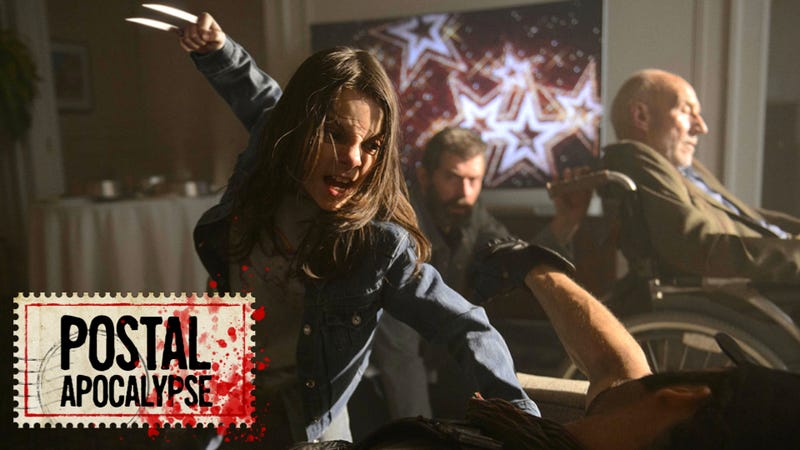
Greeting my little stamp... sidekicks... no, soul mates—wait, that’s way too personal... my little, uh.. envelope envoys? Uh, sure. this week: The most consistent fictional universe of all time! A classic fantasy series that may actually get made as a movie! And the worst decision The Walking Dead could make! Let’s stamp some... uh.. let’s just read some letters.
Last X-it
Becca:
I really like Logan but I’m confused. The movie is definitely the end of Wolverine and Hugh Jackman has said he’s done, probably. There’s all this talk of Laura/X-23 taking over as Wolverine, which I’d be fine with because she’s awesome.
But Logan takes place in 2029 and the other X-Men movies are in the past. Is Laura going to time travel back to the First Class timeline? Are new Wolverine movies still going to be set in the future?
Becca, this is an excellent question that I regret to inform you even the Postman cannot answer with any degree of certainty. You are asking me to divine the intentions of lunatics, lunatics in charge of a major superhero movie franchise. I cannot predict the actions of crazy people.
With the exception of one more group X-Men movie set in the ’90s, there is no possible future for the X-Men movie–verse that makes even the tiniest bit of sense other than a full reboot. As awesome as a movie starring Dafne Keen as the new Wolverine sounds, a sequel in the bleak, mainly mutant-less future of Logan does not seem ripe with storytelling possibilities. An X-Men movie set after the ’90s—when the original X-Men movie franchise began—seems incredibly dicey and that’s before you remember that Jean Grey, Cyclops, and Nightcrawler would suddenly be in their 30s and the original First Class group in, like, their 70s. However, a full reboot also sounds kind of shitty because I thought the new kids in Apocalypse were excellent, especially Sophie Turner as Jean Grey, and of course Keen as Laura was phenomenal.
X-producer Simon Kinberg swears he has “a plan for how these movies can connect and be a part of a larger narrative” but other than ignoring the half of the franchise stuck in the past and the other half stuck in the future and just making New Mutants and X-Force films more or less unconnected to anything other than Deadpool, I can’t imagine what that might bve.
I suppose there could be some kind of crazy time-travel universe-merging madness that somehow brought the good characters together, put them all the in the present, and replaced the rest, but as authentically X-Men-y a solution as that sounds, I have a hard time believing mass audiences will find that at all satisfying.
Fox has backed itself into a very tight corner, and the least worst solution sounds like starting over from scratch—but just because it’s the solution that makes the most sense does not mean at all that it’s the one they’ll choose. So… I have no idea. Sorry. I, as a fake mailman from the future, have failed you. But if nothing else I desperately hope we get to see Laura Kinney on-screen again.
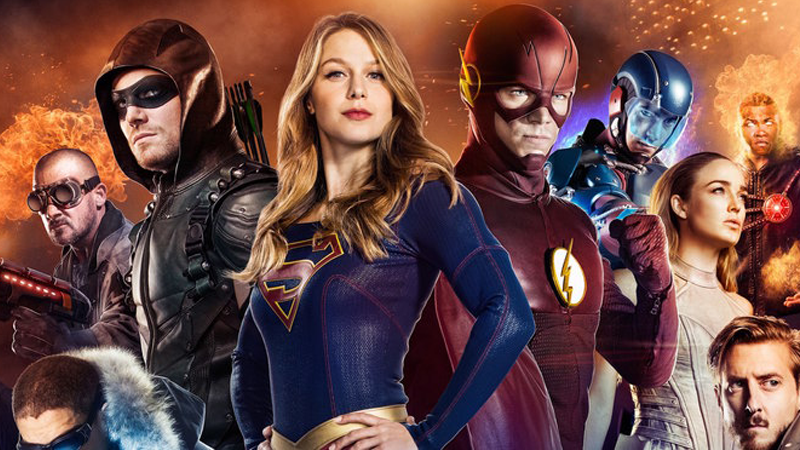
Sharing Is Erring
Scott K.:
Dear Postman,
Somewhat as a follow-up to one of last weeks questions, but what is the real reason behind the character restrictions on the CW shows? Does Warner Brothers really think that if some of these restricted characters show up for a couple of episodes, or are mentioned as existing off-screen, that it will somehow decrease the likelihood of people coming out to see the movies?
I can sort of see the argument of confusing people if the character in question had his/hers own series, like the Flash, but I still think if the movies are actually good, the people will come. I think they should use the DC multiverse to their advantage, and not restrict it. It seems pretty petty at this point not even let the word Batman be mentioned on Supergirl or Arrow when they clearly have hinted at his existence.
I am a huge DC fan, but I have had it with the DCEU movie universe already, so I really want all of DC’s characters existing on at least one Earth in the Arrowverse multiverse.
Sorry to disappoint in a different way, but it’s nothing more interesting than brand protection. Batman is one of their top characters/movie properties, and thus it always makes them (or always has the potential to make them) hundreds of millions of dollars. They don’t want to do anything that could negatively affect those ticket sales, such as 1) putting Batman on TV in a bad way that makes people less interested in seeing a Batman movie, or 2) putting Batman on TV in a good way that makes people less interested in seeing a Batman movie, because they’re content with the TV show.
To be fair, WB has clearly loosened up. Whatever you think of it, Gotham exists, although mainly because like Smallville it will never feature Bruce Wayne in a bat-costume until the final episode’s final minute. Superman appeared on Supergirl, albeit for just a couple of episodes. WB didn’t decide to yank The Flash TV series off the air when it decided to make a Flash movie, although it helped that The Flash was already airing and successful (and it’s a good thing they didn’t pull it, since the movie cannot keep a director).
You’re right that people would happily watch both a Batman TV series and a Batman movie assuming both were good, but that’s why you’re a smart person and not a cocaine-filled Hollywood executive. But Batman movies are as close to a sure thing as blockbusters get, and WB is very, very worried about doing something that could possibly affect those ticket sales in a bad way.
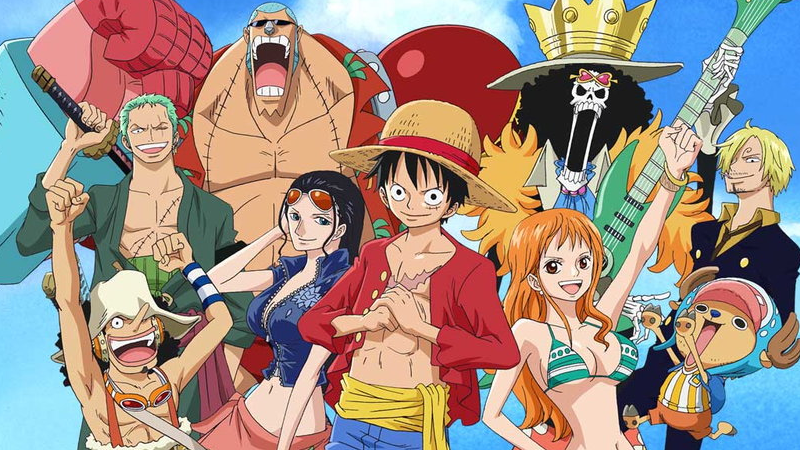
Even Universe
Matthew C.:
Greetings Postman of our impending future! I hope that the radiation levels are low and that the zombie bears are still hibernating.
My question to you has to do with fictional universes and the inherent problems that they face. A large shared universe can be a lot of fun. They have depth, complexity, and lots of characters to love or love to hate. But, as a fictional universe grows, so does the difficulty in keeping it fresh and appealing while maintaining its continuity. Invariably, the creative teams paint themselves into a corner and end up making choices that cause their worlds to jump up their own ass. For example: Retconning characters and past events so that they jive with new plot lines. Or when a major character dies only to be resurrected years (or even months) later. Or finding out that those out of character and dastardly things a hero committed wasn’t actually his/her fault because they were possessed/clone/doppelganger/android. And let’s not forget, just wiping the slate clean and rebooting said universe.
As nearly as I can tell, just about everybody (Marvel, DC, Star Wars, Star Trek, etc. . .) has committed these sins and others to varying degrees of severity. So my question is this. . . Which fictional universe has, despite its size, managed to maintain the most coherent continuity? Who’s been the best at keeping their shit together?
This is a great question, but incredibly tough. I mean, “coherency” is in the eye of the beholder, so to speak, so some people may find The Next Generation to be the perfect epitome of Star Trek, but some might feel it diverges a bit too far from what they loved about the original series, thus blemishing the franchise as whole. That’s probably not a very common example, but you get what I mean.
There’s also the degree of difficulty. The longer a universe is around the more time there is for things to be forgotten, ignored, contradicted, or needing an update; the more creators involved means more different viewpoints, favorites, goals, stories, etc. Think how many dozens of writers have just been involved in Captain America since he dethawed in 1963. Even if they all had the chance to have one big meeting before starting the first Captain America comic, how much story do you think they would all unanimously agree on? Not much.
So for my money the only way to get a truly consistent universe is to have as few creators involved as possible, preferably one—one person with one story in mind, one goal. But even then, he or she needs to set down one set of parameters before he or she starts, and then mercilessly, efficiently carry them out, because otherwise even a single creator can get off track. For instance, think about J.K. Rowling and Harry Potter. If she had known she was going make Horcruxes a thing back when she wrote Sorcerer’s Stone, she would have mentioned them, laying the seeds for their eventual reveal—and Deathly Hallows would have been a lot, lot better for it.
I’m not going to pretend I have a comprehensive knowledge of all single creator-helmed franchises in all media, but I can tell you a universe that instantly came to my mind when I read this question: One Piece. The manga has been written and drawn by one man, Eiichiro Oda (with assistants) for 20 full years. It totals well over 8,000 pages at this point, and is not even two-thirds finished. It is consistent in a way most American comics fans could only dream of.
I’m a huge fan, but what awes me most about it is that Oda clearly had his entire plan set from the beginning, allowing spaces for additional stories if warranted, and thus almost everything he’s done feels as if it was part of his intention from 1997. He clearly had all 10 major protagonists planned out from the very beginning, because main character Monkey D. Luffy announced he would have a crew of 10 right at the very beginning—even though the 10th crewmate still hasn’t been officially determined. There are major characters that have only been barely introduced that will clearly have major storylines eventually, that the manga will get around to whenever it pleases. There’s a single panel of a certain character in the first year of two who would only become a bigger supporting character 10 full years later—but Oda already knew the minor characters design back in the ’90s, a decade before he for all intents and purposes truly debuted.
How much the creator of One Piece knew before he drew his first page, and how exactly he’s stayed on that path, never fails to impress me. But again, this is my personal candidate, and I know you guys have your own. List ’em in the comments, and make your arguments!
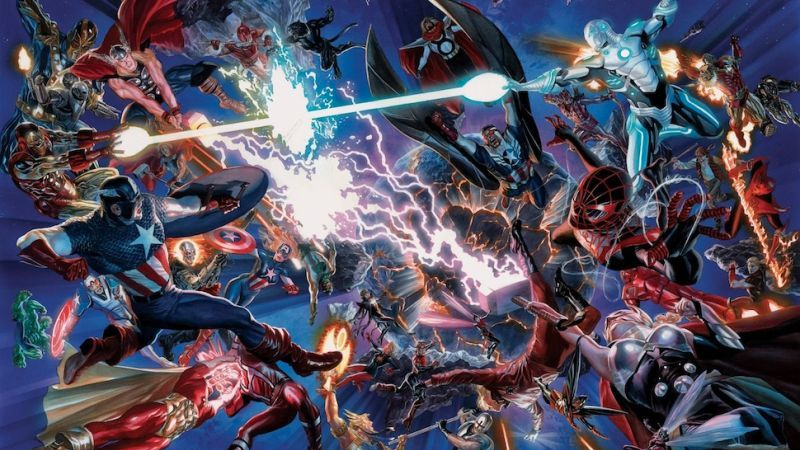
Do You Want to Know a Secret
Josh L.:
Hi Mr Postman,
I have got into reading comics in the past year or so, mostly investing time in the Marvel titles post-Secret Wars. My understanding of said event (without having read it) was that it was a slightly convoluted attempt to de-clutter the multiverse, bring everyone into one main universe, and hopefully making the comics more accessible to new readers. However the current story lines in Jessica Jones and Spider-man (and Spider-Gwen) show that the multiverse still exists and travel between them possible. So my question is: what was the point of Secret Wars?
The same point of any big comic book event: selling a lot of copies. (Guys, I hate to say this, but if you find yourself asking why a company does or doesn’t do something, the answer is “money” at least half of the time.) But also to streamline the Marvel multiverse a bit, bring some of its more popular non-616 characters into the main Marvel universe—especially Miles Morales and Old Man Logan—and also, hopefully, tell a big, fun, epic story that writer Jonathan Hickman had been building up to for quite a while.
It wasn’t ever meant to destroy the multiverse, Crisis on Infinite Earths style, which we know because it ended with the Fantastic Four and Molecule Man literally leaving to go restore the multiverse piece by piece. It’s still there when they want to tell stories that aren’t burdened by the continuity of the main Marvel universe, e.g. Spider-Gwen and Spider-Verse and whatever else suits their fancy.
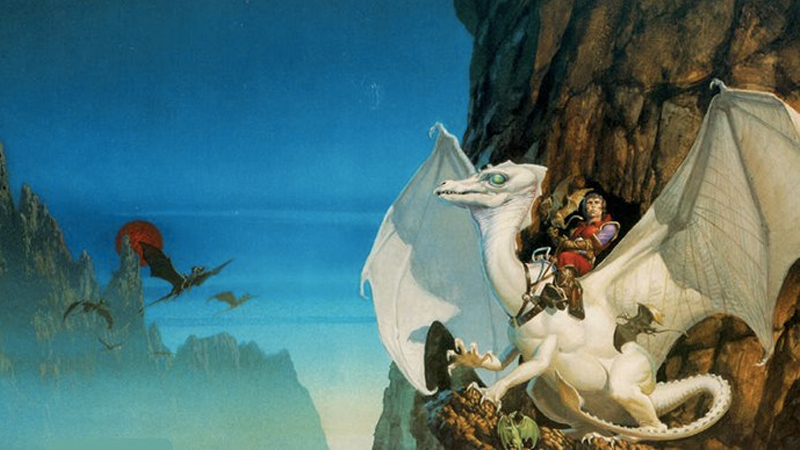
Pern Notice
Micah R.:
Hi Postman, I’ve never tried this temporal mailbox before, but if Keanu can figure one out, so can I.
I know there have been a number of false starts in getting Anne McCaffrey’s Dragonriders of Pern series adapted to the screen, both movie and TV. But this is a series I have loved for nearly as long as I could read, and I’d love to see it brought to life. What would you say the odds are of me ever seeing the dragons of Pern flying across a screen?
Contrary to my usual answer, which is usually “You will be disappointed forever,” I actually think Pern has a pretty good chance of making it to live-action. I know it’s an older fantasy series at this point, but it has people riding dragons, which in a Game of Thrones world has a certain amount of appeal.
Eventually some Hollywood executive is going to hear the pitch and be excited, especially if some aspiring writer has the brilliant but obvious idea to replace the Thread—the primary monstrous antagonist of the series, a rain of uber-destruction silver worms that are best destroyed by dragon fire before they hit the ground—with more clearly defined monsters made out of worms, which would lead to more visually exciting battles. Think about the possessed boar from the beginning of Princess Mononoke, and you get the idea.
For my money, Hollywood should start with the prequel Dragonsdawn, where it’s revealed that Pern isn’t just a fantasy series, but a scifi series where Earth people have colonized the planet, genetically engineered dragons to fight the Thread, and then eventually forgot their origins. It’s a good mix of science fiction and fantasy, á la Avatar, which I seem to recall being rather popular despite having an infinitely less interesting story.
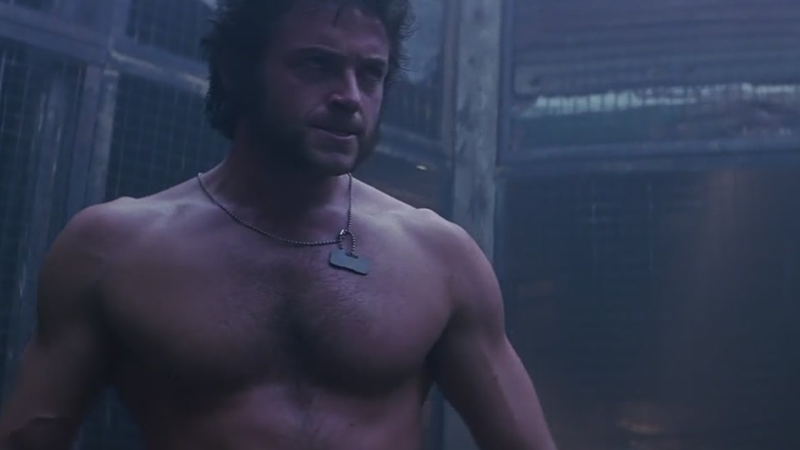
Punch-Out
Tim E.:
Dear Postman, I hope your future travels in the irradiated wasteland are more Land of Ooo and less The Road.
In light of the recent release of Logan, I wanted to ask something that’s been on my mind since the first X-Men movie. In that film, our first introduction to Logan is him in a cage match getting the crap kicked out of him until he decides to end it and punches his opponent fist to fist, which it strongly implies breaks the other guy’s hand. But... with his adamantium-coated skeleton, wouldn’t punching Wolverine in the face break your hand in the first place?
Logan’s skeleton is still covered in a nice, soft pile of skin and muscle, so it’s not like the dude was punching a full-on steel girder (especially if he was punching Logan in the gut). Also, while Wolverine’s bones are coated in adamantium, his body still moves like a normal body, which is to say if you punch him in the face he’ll stagger back; if you punch him on the side of the head his neck will swing it the opposite way, if you punch him elsewhere he’ll still stagger back. The physics allow people to punch him without breaking their hands—it probably hurts still, but far too many people have punched Wolverine over the years without shattered fists to assume otherwise.
Think about it like hitting a tetherball with a small ball of iron in the middle. It’s heavier and denser than a regular tetherball for sure, and it would absolutely hurt your hand more to punch—but the physics of it would mean you’d push it away from you before your hand shattered.
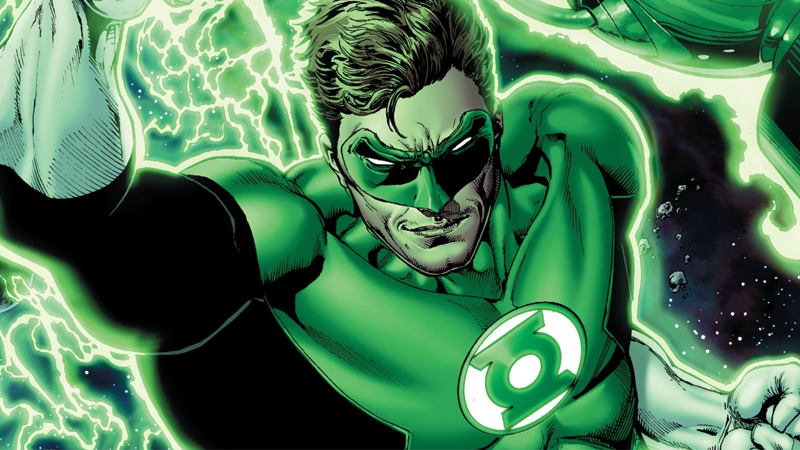
Last Willpower and Testament
Rafael:
Hi Rob,
I was discussing with a friend about DC comics and who could be the best green lantern from earth. Since the power of the ring depends on the will power of its user my friend said that Hal Jordan by default is the strongest green lantern possible. I think that Batman has more will power because well, he is Batman. Could you please help us to solve this discussion?
Willpower is such a weird, nebulous term that it’s effectively meaningless, especially when used in terms of Green Lanterns. I mean, for god’s sake, remember that all the various Lanterns group’s powers come from emotions, and willpower is not actually an emotion. By any reasonable metric both Superman and Batman and Wonder Woman all have more willpower than Hal Jordan; they have shown themselves to be far more indomitable that Hal or really any of the members of the Green Lantern corps.
But! Let’s not forget—let’s never forget—the entire Green Lantern organization is suspect because it was created by the Guardians, those little blue guys who are some of the most supercilious entities in the DC universe, and outright evil like, half the time. Even if Superman, Wonder Woman, and Batman are better choices in terms of willpower, none of them would have ever given a shit about what the Guardians wanted—they would have done what they thought was best. I think the chances are high that the ring’s instructions, when finding a suitable candidate, were for “a being with great willpower but will also do what we say.”
Also, Batman has recovered from a broken back and being stranded in the past from sheer force of willpower; Hal Jordan allowed himself to be possessed by Parallax, a giant evil space Cheeto. You tell me which one has more willpower.
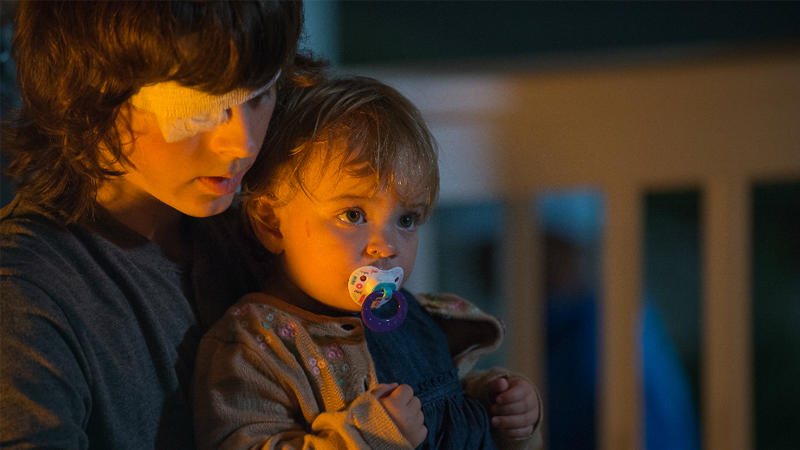
The Crawling Dead
MGM:
Wouldn’t it be amazing if Judith were a realistic toddler in The Walking Dead?
“Judith hurry! There’s a horde coming! Put your shoes on!”
“NO!” *flops down on the ground making that sound toddlers make that isn’t quite crying*
It would, until the show depicted a toddler being graphically torn apart and eaten by zombies.
Please send your queries, mysteries, disputes that need resolving, advice that needs to be given, etc. to postman@io9.com!